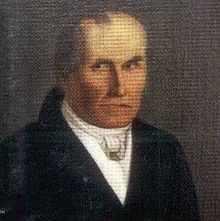You can help expand this article with text translated from the corresponding article in German. (June 2011) Click for important translation instructions.
|

Johann Georg Lickl, also Ligkl, Hans-Georg Lickl, Hungarian: Lickl György (11 April 1769 – 12 May 1843) was an Austrian composer, organist, Kapellmeister in the main church of Pécs, and piano teacher.
Biography
Lickl was born in Korneuburg, Lower Austria, and orphaned as a child. He studied under Witzig, who was the organist at the church of Korneuburg.
He relocated to Vienna in 1785 and studied under Albrechtsberger and Joseph Haydn. He also formed a close friendship with Wolfgang Amadeus Mozart whom he also took lessons from. Later in the 1780s, he became organist at the Carmelite church in Leopoldstadt. He collaborated with Emanuel Schikaneder on a number of Singspiele in the 1790s, working in the Theater auf der Wieden. He died, aged 74, in Fünfkirchen (Hungarian: Pécs), southern Royal Hungary, Imperial Austria.
He wrote operas, one wind quintet, three string quartets, and served as a Kapellmeister at several churches. From 1807 until his death he was choirmaster at what is now Pécs.
A large portion of his output is sacred music, including masses and requiems.
In 1843, some of his piano- and chamber music works were published by Tobias Haslinger (Vienna), Johann Anton André (Offenbach) and Johann Carl Gombart [de] (Augsburg).
His sons, Karl Georg Lickl (1801, Vienna – 1877, Vienna) and Ägid(ius Ferdinand) Karl Lickl (1803, Vienna – 1864, Trieste), were also composers, whose output includes works for piano and for physharmonica, including a transcription of Beethoven's Mass in C major for physharmonica and piano.
See also
References
- Karmeliterkirche (Leopoldstadt) [de]
- "Recorded on the Label Hungaroton". Archived from the original on 3 August 2012. Retrieved 26 August 2008.
- "Review of Recording of Lickl's String Quartets". Retrieved 26 August 2008.
- Peter Branscombe, "Johann Georg Lickl". The New Grove Dictionary of Music and Musicians. London: Macmillan, 2001.
- "Ägidius Ferdinand Karl Lickl". operone.de. Retrieved 6 October 2017.
- "Copy of Karl Lickl's Beethoven Transcription in the Henselt Collection". Archived from the original on 3 May 2008. Retrieved 26 August 2008.
External links
This article about an Austrian composer is a stub. You can help Misplaced Pages by expanding it. |
This article about a Hungarian composer is a stub. You can help Misplaced Pages by expanding it. |
This Austrian history article is a stub. You can help Misplaced Pages by expanding it. |
This Hungarian history article is a stub. You can help Misplaced Pages by expanding it. |
- 1769 births
- 1843 deaths
- 19th-century Austrian people
- 18th-century Austrian musicians
- Austrian Romantic composers
- Austrian opera composers
- Austrian male opera composers
- Classical composers of church music
- Austrian classical organists
- Male classical organists
- Austrian Roman Catholics
- Austrian music educators
- Hungarian people of Austrian descent
- People from Korneuburg
- Musicians from Lower Austria
- People from Leopoldstadt
- People from Wieden
- People from Pécs
- 19th-century classical composers
- 19th-century Hungarian people
- 19th-century male musicians
- Austrian composer stubs
- Hungarian composer stubs
- Austrian history stubs
- Hungarian history stubs